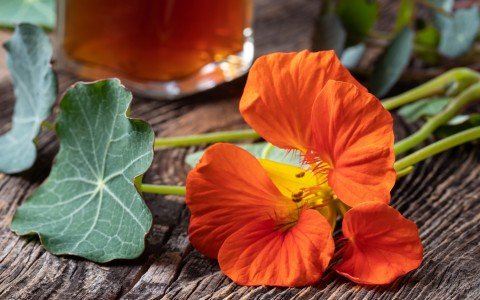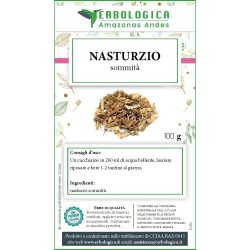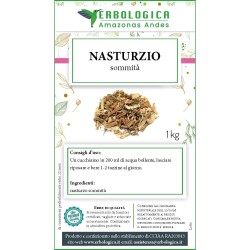
Nasturzio pianta usi e benefici
Introduzione
Scopri il potenziale inesplorato del nasturzio, una pianta vibrante e versatile che va ben oltre il suo aspetto decorativo. In questo articolo sveleremo i poteri nascosti del nasturzio e esploreremo i suoi sette sorprendenti utilizzi e benefici. Dai suoi bellissimi fiori alle foglie e ai semi dal sapore pepato, il nasturzio è una potenza di nutrienti e proprietà medicinali. Che tu sia un giardiniere alla ricerca di diversificare il tuo paesaggio o un appassionato di salute alla ricerca di rimedi naturali, questo articolo è la guida definitiva per scoprire il pieno potenziale del nasturzio. Approfondiremo le sue proprietà antibatteriche e anti-infiammatorie, esploreremo i suoi usi culinari e scopriremo persino la sua sorprendente capacità di respingere gli insetti. Preparati a rimanere stupito dalle molteplici vie in cui questa umile pianta può migliorare la tua vita. Unisciti a noi in questo viaggio alla scoperta dei segreti del nasturzio e scopri perché merita un posto di rilievo nel tuo giardino e nella tua cucina.
Usi culinari
Il nasturzio non è solo un'aggiunta decorativa ai tuoi piatti, ma può anche essere un ingrediente gustoso e nutriente nelle tue ricette. Le foglie e i fiori del nasturzio hanno un sapore piccante e pepato che può aggiungere un tocco speciale ai tuoi piatti. Puoi usarli come guarnizione per insalate, antipasti o persino per decorare torte e dolci. Le foglie di nasturzio possono essere tritate e utilizzate per preparare pesto o salse, mentre i fiori possono essere ripieni o aggiunti a cocktail e bevande per un tocco floreale. Inoltre, i semi di nasturzio possono essere raccolti e utilizzati per fare una sostituzione economica del capperi. Con il suo sapore unico e la sua versatilità, il nasturzio può portare un tocco di vivacità e originalità alle tue preparazioni culinarie.
Il gusto pepato del nasturzio non è l'unico suo pregio culinario. Questa pianta è anche ricca di vitamina C, ferro e antiossidanti, che la rendono un'aggiunta nutriente alla tua dieta. La vitamina C è essenziale per il sistema immunitario e può aiutare a combattere raffreddori e malattie comuni. Inoltre, gli antiossidanti presenti nel nasturzio possono aiutare a proteggere le cellule dai danni dei radicali liberi e a prevenire l'invecchiamento precoce. Quindi, quando aggiungi nasturzio ai tuoi piatti, non solo stai arricchendo il loro sapore, ma stai anche migliorando la loro qualità nutrizionale.
Infine, il nasturzio può anche essere un'alternativa sana e colorata ai coloranti artificiali. I suoi fiori dai vivaci colori gialli, arancioni e rossi possono essere utilizzati per colorare dolci, glassa e altri alimenti. Questo ti consente di evitare l'uso di coloranti artificiali potenzialmente dannosi e di aggiungere un tocco naturale e accattivante ai tuoi piatti. Sia dal punto di vista del gusto che dell'aspetto, il nasturzio è un ingrediente culinario che vale la pena esplorare.
Nasturzio pianta e i suoi benefici
Oltre ad essere un'aggiunta gustosa ai tuoi piatti, il nasturzio offre anche una serie di benefici per la salute. Questa pianta è ricca di sostanze nutritive e proprietà medicinali che possono aiutare a migliorare il tuo benessere generale.
Una delle proprietà più interessanti del nasturzio è la sua azione antibatterica. Le sue foglie e i suoi fiori contengono composti che possono aiutare a combattere batteri nocivi nel corpo. Questo può essere particolarmente utile nel trattamento di infezioni del tratto urinario, infezioni della pelle e persino problemi di gola. L'uso del nasturzio come rimedio naturale può aiutare a ridurre la dipendenza dagli antibiotici e a promuovere una guarigione più naturale.
Oltre alla sua azione antibatterica, il nasturzio ha anche proprietà anti-infiammatorie. Questo può aiutare a ridurre l'infiammazione nel corpo e a lenire dolori articolari e muscolari. Molti studi hanno dimostrato che i composti presenti nel nasturzio possono ridurre l'infiammazione in modo simile a farmaci antinfiammatori come l'aspirina. Quindi, se soffri di dolori o infiammazioni, potresti considerare l'aggiunta del nasturzio alla tua dieta o l'utilizzo dei suoi estratti per un sollievo naturale.
Inoltre, il nasturzio può aiutare a stimolare il sistema immunitario grazie al suo contenuto di vitamina C. La vitamina C è essenziale per la produzione di globuli bianchi, che sono responsabili della difesa del corpo contro le infezioni e le malattie. Aggiungere nasturzio alla tua dieta può aiutare a rafforzare il tuo sistema immunitario e a proteggerti da malattie comuni.
Infine, il nasturzio può anche aiutare a promuovere una buona salute digestiva. Le sue proprietà antibatteriche possono aiutare a ridurre la proliferazione di batteri nocivi nell'intestino e a migliorare la salute generale del sistema digestivo. Inoltre, le foglie di nasturzio contengono fibre che possono promuovere una buona digestione e prevenire problemi come la stitichezza. Quindi, se hai problemi digestivi o vuoi semplicemente migliorare la salute del tuo sistema digestivo, considera l'aggiunta di nasturzio alla tua dieta.
Nasturzio rimedi naturali
Oltre ai suoi benefici per la salute, il nasturzio può anche essere utilizzato come rimedio naturale per una serie di disturbi comuni. Le sue proprietà antibatteriche, antinfiammatorie e stimolanti del sistema immunitario lo rendono un'opzione interessante per coloro che cercano alternative naturali alla medicina tradizionale.
Una delle applicazioni più comuni del nasturzio come rimedio naturale è nel trattamento delle infezioni del tratto urinario. Le sue proprietà antibatteriche possono aiutare a combattere i batteri responsabili delle infezioni e a ridurre i sintomi come bruciore e dolore durante la minzione. Puoi utilizzare nasturzio fresco o preparare un decotto con le sue foglie e fiori per beneficiare delle sue proprietà curative.
Inoltre, il nasturzio può anche essere utilizzato per alleviare le infiammazioni della pelle. Se soffri di acne, dermatiti o altre condizioni infiammatorie della pelle, puoi applicare una crema o un unguento a base di nasturzio per ridurre l'infiammazione e lenire l'irritazione. Le sue proprietà antibatteriche possono anche aiutare a ridurre la proliferazione di batteri sulla pelle e a prevenire infezioni cutanee.
Il nasturzio può anche essere utilizzato come rimedio per il mal di gola e il raffreddore. Puoi preparare un infuso con le foglie e i fiori di nasturzio e berlo caldo per alleviare il mal di gola e lenire la tosse. Le sue proprietà antibatteriche e stimolanti del sistema immunitario possono aiutare a combattere l'infezione e a ridurre i sintomi del raffreddore.
Infine, il nasturzio può essere utilizzato per alleviare dolori articolari e muscolari. Puoi applicare un unguento o un olio a base di nasturzio sulla zona dolorante per ridurre l'infiammazione e lenire il dolore. Le sue proprietà antinfiammatorie possono aiutare a ridurre l'infiammazione nelle articolazioni e a migliorare la mobilità.
Nasturzio per la cura della pelle
Il nasturzio non è solo un rimedio naturale per la salute, ma può anche essere utilizzato per migliorare la tua bellezza e la tua cura della pelle. Le sue proprietà antibatteriche, antinfiammatorie e lenitive lo rendono un ingrediente interessante per prodotti per la cura della pelle e della bellezza.
Uno dei modi più comuni per utilizzare il nasturzio nella cura della pelle è attraverso creme e unguenti. Puoi trovare prodotti per la pelle a base di nasturzio che possono aiutare a ridurre l'infiammazione, lenire l'irritazione e migliorare la salute generale della tua pelle. Questi prodotti possono essere particolarmente utili per coloro che soffrono di acne, dermatiti o altri problemi cutanei infiammatori.
Inoltre, il nasturzio può essere utilizzato come ingrediente in scrub e maschere per il viso. I suoi fiori e le sue foglie possono essere tritate e mischiate con altri ingredienti per creare una maschera nutriente e illuminante per il viso. Le proprietà antibatteriche del nasturzio possono aiutare a ridurre l'acne e i brufoli, mentre le sue proprietà antinfiammatorie possono ridurre l'infiammazione e lenire la pelle irritata.
Il nasturzio può anche essere utilizzato come ingrediente in shampoo e balsami per i capelli. Le sue proprietà antibatteriche possono aiutare a combattere i batteri che causano prurito e irritazione del cuoio capelluto, mentre le sue proprietà lenitive possono lenire il cuoio capelluto secco e irritato. Inoltre, il nasturzio può dare ai capelli un aspetto sano e lucente grazie al suo contenuto di vitamine e antiossidanti.
Infine, il nasturzio può anche essere utilizzato come ingrediente in prodotti per la cura delle unghie. Puoi trovare smalti per unghie a base di nasturzio che possono aiutare a rinforzare le unghie e prevenire la loro rottura. Inoltre, il suo colore vivace può dare alle tue unghie un aspetto unico e accattivante.
Nasturzio pesticida naturale
Oltre ai suoi benefici culinari e per la salute, il nasturzio può anche essere utilizzato nel giardinaggio e nel controllo dei parassiti. Questa pianta ha una serie di proprietà che la rendono un'aggiunta preziosa al tuo giardino.
Una delle proprietà più interessanti del nasturzio è la sua capacità di respingere gli insetti nocivi. Il suo odore e il suo sapore piccante possono allontanare insetti come afidi, mosche bianche e coleotteri. Puoi piantare nasturzio vicino alle piante che tendono ad attirare questi insetti per creare una barriera naturale e ridurre l'infestazione. Inoltre, il nasturzio può anche attirare insetti benefici come api e farfalle, che possono aiutare a impollinare le tue piante e a migliorare la biodiversità del tuo giardino.
Oltre a respingere gli insetti nocivi, il nasturzio può anche migliorare la salute delle tue piante. Le sue radici rilasciano composti che possono aiutare a migliorare la struttura del terreno e a favorire la crescita di altre piante. Inoltre, il nasturzio può anche aiutare a prevenire l'accumulo di parassiti e malattie nel terreno grazie alle sue proprietà antibatteriche. Quindi, se hai un orto o un giardino, considera di piantare nasturzio vicino alle tue piante per migliorare la loro salute e la loro resa.



